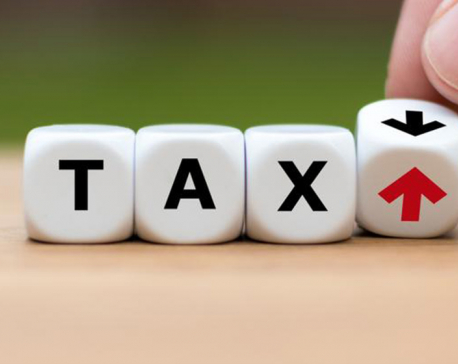
OR
Budget FY 2023/24
Govt’s decision to increase direct taxes prompts fears of economic downturn amid recession
Published On: June 4, 2023 08:30 AM NPT By: RAJESH KHANAL
_20230530080540.jpg)
KATHMANDU, June 4: The government that reeled under the low revenue collection has widely revised the tax structure, particularly provision of direct tax, at a time when the country is undergoing recession with the massive fall in aggregate demand.
Nepal’s per capita public debt has increased to Rs 73,860. It has increased four-folds in the past one decade, mainly due to an increasing unproductive spending along with slow growth in the government revenue collection.
Likewise, the country’s budget deficit has hit Rs 271 billion as of May end this year. While there is a growing call for reducing the government’s recurrent expenditure, the government has completely ignored the matter and just focused on increasing taxes to collect more revenue through the budget announcement last Monday.
The government has nominally increased the minimal tax slab to Rs 600,000 from Rs 550,000 annually for the salary earners, providing some respite to the lower income group. However, the government has slapped income tax as high as 39 percent on the upper limit—those earning more than Rs 5 million per year.
Likewise, the income of investors on stock exchange and real estate has been considered in the income tax bracket, in addition to the existing capital gains tax. Similarly, employers have to pay income tax in advance on behalf of their staff.
The direct taxes on registration and renewal of automobiles have also been increased. In the new provision, the vehicle owners have to pay an average of additional Rs 1,000-2,000 in tax while settling the annual tax. In addition, the tax on interest earnings has also been increased to six percent from the existing five percent.
The government has also increased the customs and excise duty up to 15 per cent on entry-level electric cars, jeeps and vans. In the new provision, the electric vehicles with capacity of 50-100 KW will have to pay 15 percent customs duty, up from 10 percent, while a 10 percent excise duty has also been introduced in this segment. It is likely to make the public transport under electric vehicles expensive by up to Rs 1 million, according to automobile dealers.
The government has embraced additional 34 types of goods under the excise duty. These include non-alcoholic beverages, polymers, padlocks, electronic cigarettes, cosmetics, and kitchen utensils, among others.
Economist Prithvi Raj Ligal said the budget might not address the problems that the economy has been facing at this moment of recession. “It seems the government lacked proper homework while fixing the new tax rates,” he said.
The government has announced the budget for the fiscal year 2023/24 at Rs 1.751 trillion, surpassing the ceiling of Rs 1.688 trillion fixed by the National Planning Commission (NPC). At the time when there is a need for reducing government expenditure, the recurrent expenditure has increased to Rs 1.141 trillion, with an additional amount of Rs 387 billion for the upcoming fiscal compared to the current FY.
Likewise, the government has set ambitious target of revenue collection at Rs 1.248 trillion and receiving foreign grants of Rs 50 billion, both of which seem almost impossible considering the poor performance in the segment this year. “The budget this year appears quite unprofessional,” Ligal said.
You May Like This

Illogical Raise in Direct Taxes
The recent revision of the tax structure by the government, which includes an increase in direct taxes and a broader... Read More...
_20230530080540.jpg)
Govt targets to achieve higher economic growth of 6 pc through increased recurrent expenditure than promoting development budget
KATHMANDU, May 30: The government has announced the budget for the fiscal year 2023/24 at Rs 1.751 trillion, which is... Read More...

Beer price to rise by Rs 10 per bottle, government hikes excise duty by Rs 7 per liter
KATHMANDU, May 29: The price of beer will increase by Rs 10 per bottle. According to the budget announced by... Read More...



Just In
- World Malaria Day: Foreign returnees more susceptible to the vector-borne disease
- MoEST seeks EC’s help in identifying teachers linked to political parties
- 70 community and national forests affected by fire in Parbat till Wednesday
- NEPSE loses 3.24 points, while daily turnover inclines to Rs 2.36 billion
- Pak Embassy awards scholarships to 180 Nepali students
- President Paudel approves mobilization of army personnel for by-elections security
- Bhajang and Ilam by-elections: 69 polling stations classified as ‘highly sensitive’
- Karnali CM Kandel secures vote of confidence















Leave A Comment